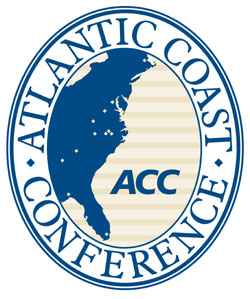 Recent
Recent
published reports have released the ACC’s latest revenue sharing data, and
financially, Virginia Tech’s move to their new conference has been better than
expected. The latest numbers are for the 2005-06 fiscal year, when the Hokies
didn’t yet receive full revenue sharing, and they still received a significant
amount more than they did in their final year in the Big East.
The move from a nine teams to 12 teams appears to have been a profitable one
for most of the schools in the ACC. The following table compares ACC revenue
sharing of the 2003-04 fiscal year, the last time the ACC was a nine-team
conference, to 2005-06, the second year of ACC expansion and the first year as a
12-team conference. For Boston College, Miami and Virginia Tech, the number
listed in the 2003-04 column is the amount they received in their final year in
the Big East. For Miami and VT, that was 2003-04. For BC, it was 2004-05.
| ACC Revenue Comparisons, Pre- and Post-Expansion |
|||
| School | 2003-04 | 2005-06 | Difference |
Virginia Tech |
$6.05M | $8.45M | $2,400,000 |
Boston College* |
$7.08M | $8.54M | $1,460,000 |
Georgia Tech |
$11.13M | $12.2M | $1,070,000 |
Virginia |
$11.09M | $12.05M | $960,000 |
Clemson |
$11.07M | $11.99M | $920,000 |
North Carolina |
$10.17M | $10.98M | $810,000 |
Florida State |
$11.68M | $12.47M | $790,000 |
Duke |
$10.2M | $10.94M | $740,000 |
Wake Forest |
$10.09M | $10.8M | $710,000 |
NC State |
$11.35M | $11.93M | $580,000 |
Miami |
$9.03M | $8.94M | -$90,000 |
Maryland |
$11.14M | $10.95M | -$190,000 |
For Boston College, the number in the 2003-04 column is their number from 2004-05, their last year in the Big East. |
|||
Note that variances in ACC payouts are caused by bowl expense reimbursement and
other factors.
In terms of increased revenue, Virginia Tech came out on top. The Hokies made
just over $6 million their last year in the Big East. They were guaranteed to
make $6.25 million in each of their first two years in the ACC. Instead, they
earned more than that: $6.5 million in 2004-05 and a whopping $8.45 million in
2005-06. When the latest numbers are released next year at this time, the Hokies
will be getting a full share, so their total will be more in line with those of
Clemson, Virginia, Maryland, etc. The average payout this season among the 12
schools was $10.8 million, so that’s what the Hokies have to look forward to.
In addition to increased revenue sharing, Virginia Tech has saved money on
travel expenses since joining the ACC. When VT joined the ACC in the summer of
2003, Tech athletic director Jim Weaver estimated about $600,000 in travel
savings per year across the athletic department. Instead of cutting the budgets
for the sports that saved money on travel, Weaver left it at the discretion of
those programs to use the savings for recruiting, equipment, etc.
The only teams that have not seen an increase in revenue sharing since
2003-04 are Maryland and Miami. However, the Hurricanes will see an increase
next season when they get full ACC revenue sharing for the first time. The
Hokies, Boston College and Georgia Tech are the three schools that have seen
their revenues increase by over $1 million, with VT’s increase topping out at
$2.4 million.
A big reason for the ACC’s increased revenue sharing is a renegotiated
television contract, a conference football championship game and more bowl
revenue. When the conference expanded to 12 teams, the ACC’s television contract
for football and men’s basketball increased by $16.9 million. The new ACC
Championship Game in Jacksonville brought in $5.7 million, while bowl payouts
increased by $3 million.
Without increased revenues from the television contracts, ACC Championship
Game and bowl payouts, revenue sharing would have actually decreased for each
school when the conference moved from nine teams to 12 teams. Original
projections called for each of the 12 ACC teams to get about $9 million in
revenue sharing after full sharing kicked in for the new members. That would
have been good for the new members, but bad for the original nine schools.
Instead, Miami, Virginia Tech and Boston College added enough value to the
conference that they could renegotiate their television contract for a lot more
money.
ACC Proposes Early Signing Period for Football
The ACC just finished up its spring meetings at Amelia Island, Florida, and
an interesting new proposal was revealed on Wednesday. The league is proposing
that the NCAA adopt an early signing period for football. Basketball and other
sports have two signing periods for each recruiting class, but football only has
one.
The ACC wants to cut down on decommitments and the recruitment of players
that have already verbally committed to another school. They are proposing that
the Wednesday before the third week of December be the new early signing period.
The current signing day of the first Wednesday in February would remain the same
and become the “late” signing period.
There are a lot of proponents of an early signing date in college football,
although there is disagreement on the date. The ACC obviously favors a date in
December, while others think a date in July or August would be more appropriate.












Tech Sideline is Presented By: